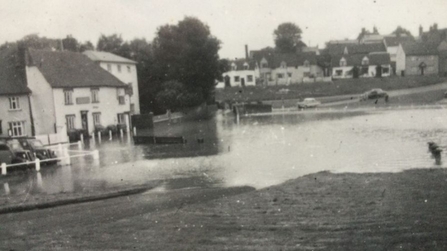Beavers are engineers of entire ecosystems. With paddled tails and iron-enriched teeth, beavers have the tools to restore and maintain important wetland habitats, helping us to tackle climate change and provide a habitat that supports lots of wildlife.
beaver video (https://www.youtube.com/watch?v=RTn7vN5hAq0)
Video credit: Spains Hall Estate
Slow the flow for Finchingfield
Residents of Finchingfield village in Braintree have been used to the flooding conditions for decades. After severe flooding in the village in 2012 and 2014, Spains Hall Estate launched a new project, in conjunction with Essex Wildlife Trust, the Environment Agency and Essex and Suffolk Rivers Trust.

Finchingfield flood in 1958 - Credit: Simon Linsell-Clark
Beavers at Spains Hall Estate
What once was dry woodland, with only a stream running through that would stop flowing during parts of the year, is now transformed. The beavers have created complex wetland made up of a series of dams, pools and canals, holding water on-site during floods and releasing it slowly during dry periods. This water security, along with the filtering effects of the series of dams, has led to increased biodiversity with water shrews, freshwater shrimp and kingfishers back on site and cleaner water flowing downstream.
Archie Ruggles-Brise, Manager of Spains Hall Estate, says:
“We are the proud home of the first beavers to return to Essex for over 400 years. As a working farming estate, we care deeply about our environment, woodlands and the wildlife we provide a home for. Working with Essex Wildlife Trust means we can track the beavers and their management of our site, to demonstrate how effective they are as a nature-based solution.”




